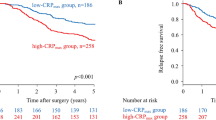Abstract
Background
The correlation between postoperative systemic inflammation and cancer survival needs to be elucidated. This study evaluated postoperative inflammation using the peak concentration of postoperative serum C-reactive protein (CRP) levels and duration of CRP elevation, then investigated its correlation with prognosis.
Methods
The study retrospectively reviewed 216 consecutive patients who underwent curative transthoracic esophagectomy at the authors’ institution between 2004 and 2012. The postoperative serum CRP levels in 215 patients were analyzed during 14 days after esophagectomy. The patients’ characteristics, surgical procedures, postoperative complications, and survival were investigated. To evaluate postoperative inflammatory status objectively using CRP, patients with a delayed CRP level peak and persistent CRP elevation were classified as having an intense postoperative inflammatory response (IIR).
Results
The distributions of postoperative pathologic stages 0, 1, 2, 3, and 4 were respectively 5, 70, 58, 66, and 16. Regarding postoperative complications, pneumonia was diagnosed in 42 patients (20 %), anastomotic leakage in 32 patients (15 %), and superficial surgical-site infection in 21 patients (10 %). A delayed CRP level peak was observed in 88 patients (41 %) and persistent CRP elevation in 49 patients (23 %). Overall, 31 patients (14 %) were classified as having IIR. In the survival analysis, the patients with IIR showed a significantly shorter overall survival. In the multivariate analysis, using histology, neoadjuvant treatment, field of lymph node dissection, pathologic stage, and IIR as covariates, IIR was seen as a significantly independent predictive factor for overall survival (hazard ratio 2.019; P = 0.019).
Conclusions
In this study, IIR was significantly correlated with postoperative survival. Therefore, the oncologic benefit of reducing postoperative inflammation in esophageal cancer needs to be investigated.


Similar content being viewed by others
References
van Hagen P, Hulshof MC, van Lanschot JJ, et al. Preoperative chemoradiotherapy for esophageal or junctional cancer. N Engl J Med. 2012;366:2074–84.
Ando N, Kato H, Igaki H, et al. A randomized trial comparing postoperative adjuvant chemotherapy with cisplatin and 5-fluorouracil versus preoperative chemotherapy for localized advanced squamous cell carcinoma of the thoracic esophagus (JCOG9907). Ann Surg Oncol. 2012;19:68–74.
Germano G, Allavena P, Mantovani A. Cytokines as a key component of cancer-related inflammation. Cytokine. 2008;43:374–9.
Coussens LM, Werb Z. Inflammation and cancer. Nature. 2002;420:860–7.
Takeuchi H, Miyata H, Gotoh M, et al. A risk model for esophagectomy using data of 5354 patients included in a Japanese nationwide web-based database. Ann Surg. 2014;260:259–66.
Lindner K, Fritz M, Haane C, Senninger N, Palmes D, Hummel R. Postoperative complications do not affect long-term outcome in esophageal cancer patients. World J Surg. 2014;38:2652–61.
Xia BT, Rosato EL, Chojnacki KA, Crawford AG, Weksler B, Berger AC. Major perioperative morbidity does not affect long-term survival in patients undergoing esophagectomy for cancer of the esophagus or gastroesophageal junction. World J Surg. 2013;37:408–15.
Rizk NP, Bach PB, Schrag D, et al. The impact of complications on outcomes after resection for esophageal and gastroesophageal junction carcinoma. J Am Coll Surg. 2004;198:42–50.
Dindo D, Demartines N, Clavien PA. Classification of surgical complications: a new proposal with evaluation in a cohort of 6336 patients and results of a survey. Ann Surg. 2004;240:205–13.
Singh PP, Zeng IS, Srinivasa S, Lemanu DP, Connolly AB, Hill AG. Systematic review and meta-analysis of use of serum C-reactive protein levels to predict anastomotic leak after colorectal surgery. Br J Surg. 2014;101:339–46.
Platt JJ, Ramanathan ML, Crosbie RA, et al. C-reactive protein as a predictor of postoperative infective complications after curative resection in patients with colorectal cancer. Ann Surg Oncol. 2012;19:4168–77.
Shiba H, Furukawa K, Fujiwara Y, et al. Postoperative peak serum C-reactive protein predicts outcome of hepatic resection for hepatocellular carcinoma. Anticancer Res. 2013;33:705–9.
Roxburgh CS, Salmond JM, Horgan PG, Oien KA, McMillan DC. Comparison of the prognostic value of inflammation-based pathologic and biochemical criteria in patients undergoing potentially curative resection for colorectal cancer. Ann Surg. 2009;249:788–93.
Forrest LM, McMillan DC, McArdle CS, Angerson WJ, Dunlop DJ. Comparison of an inflammation-based prognostic score (GPS) with performance status (ECOG) in patients receiving platinum-based chemotherapy for inoperable non-small-cell lung cancer. Br J Cancer. 2004;90:1704–6.
Forrest LM, McMillan DC, McArdle CS, Angerson WJ, Dunlop DJ. Evaluation of cumulative prognostic scores based on the systemic inflammatory response in patients with inoperable non-small-cell lung cancer. Br J Cancer. 2003;89:1028–30.
Matsuda S, Takeuchi H, Kawakubo H, et al. Cumulative prognostic scores based on plasma fibrinogen and serum albumin levels in esophageal cancer patients treated with transthoracic esophagectomy: comparison with the glasgow prognostic score. Ann Surg Oncol. 2015;22:302–10.
Matsuda S, Takeuchi H, Fukuda K, et al. Clinical significance of plasma fibrinogen level as a predictive marker for postoperative recurrence of esophageal squamous cell carcinoma in patients receiving neoadjuvant treatment. Dis Esophagus 2013;27:654–61.
Takeuchi H, Ikeuchi S, Kitagawa Y, et al. Pretreatment plasma fibrinogen level correlates with tumor progression and metastasis in patients with squamous cell carcinoma of the esophagus. J Gastroenterol Hepatol. 2007;22:2222–7.
Warschkow R, Tarantino I, Ukegjini K, et al. Diagnostic study and meta-analysis of C-reactive protein as a predictor of postoperative inflammatory complications after gastroesophageal cancer surgery. Langenbecks Arch Surg. 2012;397:727–36.
Lu CY, Uen YH, Tsai HL, et al. Molecular detection of persistent postoperative circulating tumour cells in stages II and III colon cancer patients via multiple blood sampling: prognostic significance of detection for early relapse. Br J Cancer. 2011;104:1178–84.
Conflict of interest
There are no conflicts of interest.
Author information
Authors and Affiliations
Corresponding author
Rights and permissions
About this article
Cite this article
Matsuda, S., Takeuchi, H., Kawakubo, H. et al. Correlation Between Intense Postoperative Inflammatory Response and Survival of Esophageal Cancer Patients Who Underwent Transthoracic Esophagectomy. Ann Surg Oncol 22, 4453–4460 (2015). https://doi.org/10.1245/s10434-015-4557-5
Received:
Published:
Issue Date:
DOI: https://doi.org/10.1245/s10434-015-4557-5




